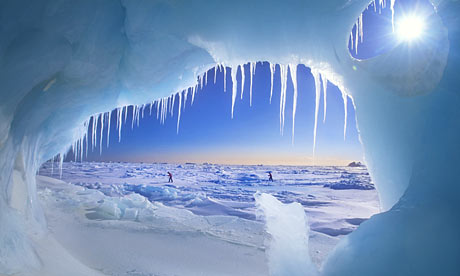Polar Bears
On Thin Ice
The Arctic is warming so fast that by 2050 it may be largely ice free in summer. Without their frozen hunting platform, how will polar bears survive?
By Susan McGrath
Photograph by Florian Schulz
In August 1881 the naturalist John Muir was sailing off Alaska aboard the steamer
Thomas Corwin, searching for three vessels that had gone missing in the Arctic. Off Point Barrow he spotted three polar bears, "magnificent fellows, fat and hearty, rejoicing in their strength out here in the bosom of the icy wilderness."
Were Muir to sail off Point Barrow in August today, any polar bears he'd see would not be living in a wilderness of ice but swimming through open water, burning precious fat reserves. That's because the bears' sea-ice habitat is disappearing. And it's going fast.
Polar bears ply the Arctic niche where air, ice, and water intersect. Superbly adapted to this harsh environment, most spend their entire lives on the sea ice, hunting year-round, visiting land only to build maternal birthing dens. They prey mainly on ringed and bearded seals (it's been said that they can smell a seal's breathing hole from more than a mile away) but sometimes catch walruses and even beluga whales.
Sea ice is the foundation of the Arctic marine environment. Vital organisms live underneath and within the ice itself, which is not solid but pierced with channels and tunnels large, small, and smaller. Trillions of diatoms, zooplankton, and crustaceans pepper the ice column. In spring, sunlight penetrates the ice, triggering algal blooms. The algae sink to the bottom, and in shallow continental shelf areas they sustain a food web that includes clams, sea stars, arctic cod, seals, walruses—and polar bears.
Experts estimate the world's polar bear numbers at 20,000 to 25,000, in 19 subpopulations. Bears in Svalbard (the Norwegian archipelago where Florian Schulz made most of these photographs), the Beaufort Sea, and Hudson Bay have been studied the longest. It was in western Hudson Bay, where ice melts in the summer and freezes back to shore in the fall, that the creatures' predicament first came to light.
Read More:
http://ngm.nationalgeographic.com/2011/07/polar-bears/mcgrath-text
 Washed away: Rocks and rusting steel are all that now remains of the once beautiful sandy beach at Kingscliff. Photo: Michael Bryant
Washed away: Rocks and rusting steel are all that now remains of the once beautiful sandy beach at Kingscliff. Photo: Michael Bryant Kingscliff in 2008 before erosion destroyed the beach. Photo: Michael Bryant
Kingscliff in 2008 before erosion destroyed the beach. Photo: Michael Bryant A 2009 photo of waves undermining the Kingscliff breakwall. Photo: Michael Bryant
A 2009 photo of waves undermining the Kingscliff breakwall. Photo: Michael Bryant



 For more than a week the mountain has been rumbling and scientists warned that an eruption was imminent. In the past such warnings may have gone unheeded until it was too late.
For more than a week the mountain has been rumbling and scientists warned that an eruption was imminent. In the past such warnings may have gone unheeded until it was too late.